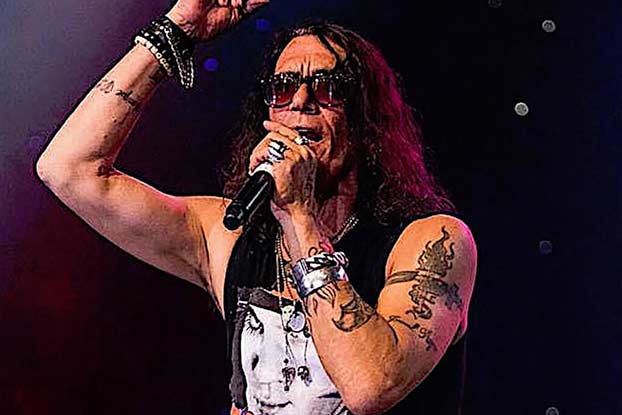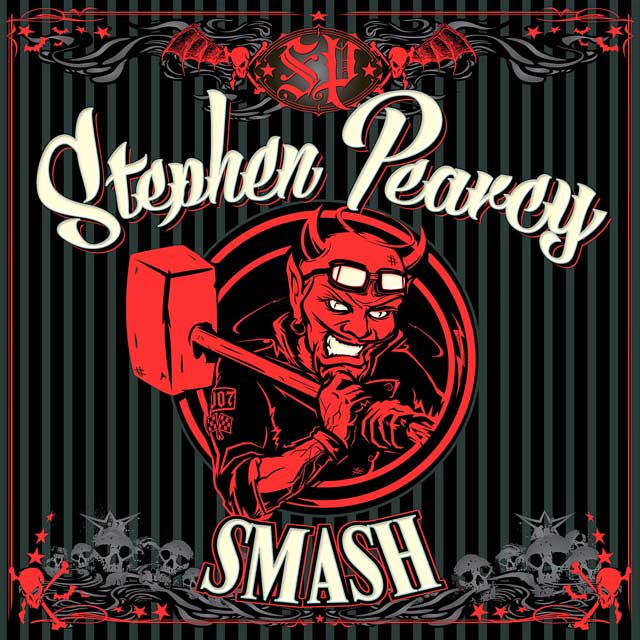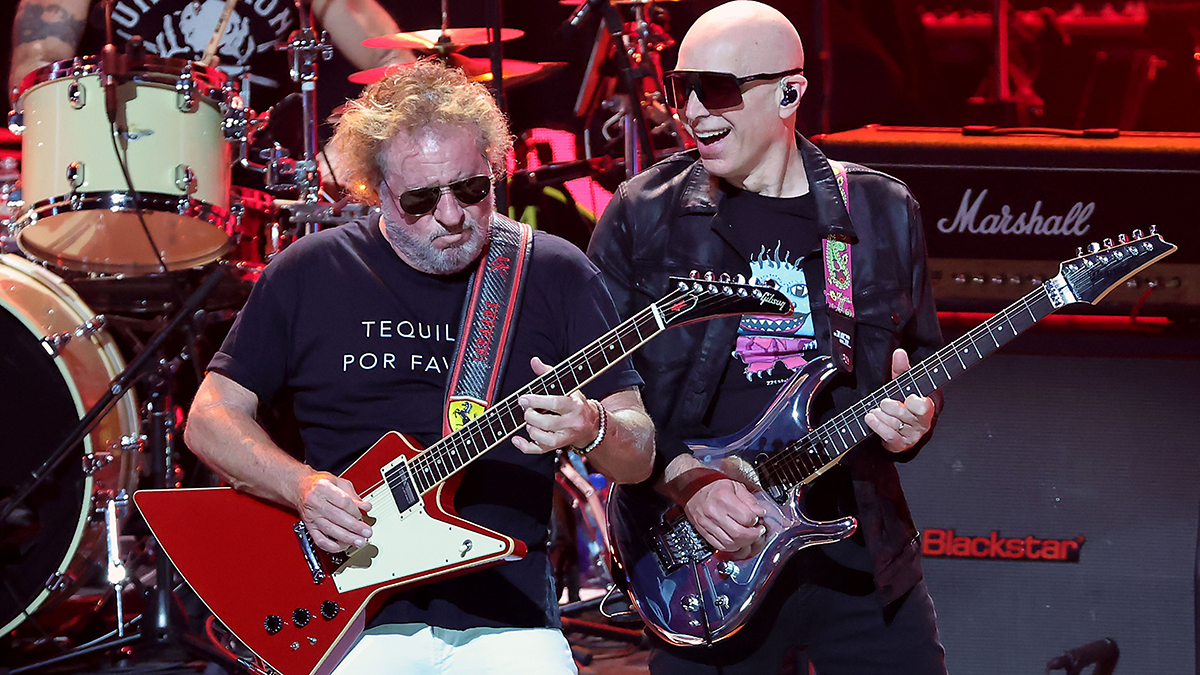'Smash': Stephen Pearcy Talks New Solo Album and the Reunited Ratt

“I was actually just pulling out my Explorer earlier today,” Stephen Pearcy says when Guitar World calls him at home late on a January afternoon.
It’s not the first thing you expect to hear from the guy who made his name back in the Eighties as the singer for LA-via San-Diego hard rockers Ratt. But with Pearcy, there’s a lot more than meets the eye.
“The perception with me is that I don’t do anything but yell at people,” he says with a laugh.
“But I’ve been playing guitar since day one. I started out as a guitar player. I didn’t wanna sing, you know? But then I just stumbled into position. Actually, I went to go audition for this band as a guitar player, and the guys there said, ‘We already have a guitar player. Can you sing?’ I was like, ‘I don’t know. I guess…’ Next thing you know I’m not playing guitar—I’m singing.” Pearcy laughs again. “Or at least trying!”
Despite his self-deprecation, Pearcy was clearly cut out for his adopted position. More than 30 years after Ratt hit the big time with their breakout single, “Round and Round,” the singer, who has sold more than 15 million records over the course of his career, is as busy as ever.
He’s about to release a new solo album, Smash, his first for Frontiers Records, and, following a year or so of legal wrangling with former Ratt drummer Bobby Blotzer, Pearcy and his Ratt cohorts are gearing up for a slew of live dates this year, as well as starting work on a new studio album, their first since 2010’s well-received reunion effort, Infestation.
“As far as I’m concerned, we’re on the right track,” Pearcy says. “And the writing’s gonna take the same path as I took with Smash. We’re gonna take our time, do it right. With Smash, we nailed it. And for Ratt, we wanna make it the biggest record we’ve had.”
Get The Pick Newsletter
All the latest guitar news, interviews, lessons, reviews, deals and more, direct to your inbox!
So, tell me about this Gibson Explorer of yours.
It’s great. I loaded it up with early Seventies Bill Lawrence pickups—the blond ones. I used to have those in the Seventies, too, when I first started playing. They’re really hard to find. I found a couple in a pawn shop, actually. But these are old. There’s actually resin on the back. Like honey resin. It’s crazy. It’s a brilliant guitar. The sound and the tone, it’s like Page all the way. That clean distortion.
As far as your guitar connections, back in the days before Ratt hit you were actually pretty good friends with Eddie Van Halen. You gave him some gear, correct?
I met Ed in ’78—I started going to see Van Halen when they started playing the Whisky. I used to sit on the side of the stage and watch ‘em. At one of these gigs he had this old Marshall head, and I said, “Hey, I’ve got one of those!” He was like, “No fucking way!” Then he had two of those swivel Vox Beatle cabinets, but he only had one Vox head. And I said, “I have one of those, too.” And he said, “No way! I want it.” And I go, “Okay…you’re Eddie Van Halen. Sure!” And I regret it to this day.
You’ve gotta get it back from him.
[laughs] Not possible. Actually, there are pictures of it in some of their early rehearsal photos.
So how did Smash come together?
About a year and a half ago, I started working on music for a solo record I was gonna call Suckerpunch. I was gonna release it as a four-part thing—four songs and four CDs. So I started writing songs and putting stuff together. Three of the songs are out there on [Pearcy’s label] Top Fuel Records. But the other one, a song called “I Can’t Take It,” I said, “You know, there’s something about this song…”
So I called [former Ratt producer] Beau Hill and I said, “Beau, could you mix and master something for me?” He said, “Sure. What d’ya got?” He got a hold of it and when he sent it back I said, “Oh, shit, this is insane! What did you do here? This is great.” And I just kept compiling songs.
Then about six months ago I got a call from an old Atlantic rep, Derek Shulman. He said, “Hey, Frontiers likes your stuff. Would you like to talk to them?” I release my own stuff on my own time and dime, but I said, “Yeah, sure.” We started talking and we worked something out.
Then when I got off the road I started recording. And Erik [Ferentinos, guitar] and myself, we’d already written or co-written probably 15 songs, if not more. We were getting ready to go in there and then the Frontiers thing happened and I said, “Gentlemen, we’re starting from scratch. But we’re gonna keep one song—‘I Can’t Take It’—because that’s gonna be our schematic for how we’re going to approach this.”
And it just so happens that in “I Can’t Take It” I mention a couple of times the word “smash.” And it started sticking with me. So I said, “And guess what? The record’s called Smash!” [laughs]
You’ve been working with Erik in your solo career for a while. What does he bring to the table as a guitarist?
Erik’s been with me for about 14 years now. What he brings to the table is he’s like Warren [DeMartini] in the respect that when Warren joined Ratt, he just grew by leaps and bounds every year. Like, “Holy shit—this is crazy!” And Erik is just…he’s like some kind of alien to me. He writes the most insane stuff, and he knows right where I’m going. He knows exactly what I like, what I can sink my teeth into. He’s just leaping-and-bounding every day.
There are a lot of different sounds and styles on the new record.
That’s me and Erik. He kept coming to me with these different styles of songs and I was just like, “This is amazing.” Because I wanted to be so diverse on this record. I didn’t want people to just be like, “Ah, yeah, it’s a rock record. They all sound the same…” Sometimes, it is what it is—I can’t change the sound of my voice, and I like hard rock.
But I can still write ballads and this and that. And Eric brings a lot of that to the table. Like, “Let’s do different stuff. Really different stuff.” And we just work so well together. It’s a very complimentary writing and musical relationship. He’s one talented guy. It’s like me and Warren and Robbin [Crosby] getting together and writing “Round and Round.” That song happened in one day.

One Smash track, “10 Miles Wide,” is very Ratt-like.
When Erik went and did “10 Miles Wide,” he literally said to me in the studio, “Wow, it’s like I was channeling Robbin.” And I went, “Ya think? Jesus Christ! That’s early Ratt right there!” It’s like EP/[Out of the] Cellar days. That’s actually the single we’re going to be shooting a video for at the end of the week.
You’re also gearing up for a solo tour in support of Smash.
The solo Smash dates start soon, and they run until July 2. Then in the meantime, since the dust is settling up from the fiasco over the last year, Ratt is headlining M3 [Rock Festival] and booking some other festivals. And we start February 11 with the first show.
What else is coming up for Ratt?
With the Ratt situation we’re taking it very slowly and methodically. And the three of us [Pearcy, DeMartini and bassist Juan Croucier], we’re cohesive. Thirty years later we’re on one planet, finally. And, actually, Warren and I are already demoing songs for an album. We’ve already demoed two songs. We wanna start on that by the end of the year. We want this to be the best that anybody’s ever heard from us.
Rich is the co-author of the best-selling Nöthin' But a Good Time: The Uncensored History of the '80s Hard Rock Explosion. He is also a recording and performing musician, and a former editor of Guitar World magazine and executive editor of Guitar Aficionado magazine. He has authored several additional books, among them Kurt Cobain: Montage of Heck, the companion to the documentary of the same name.










